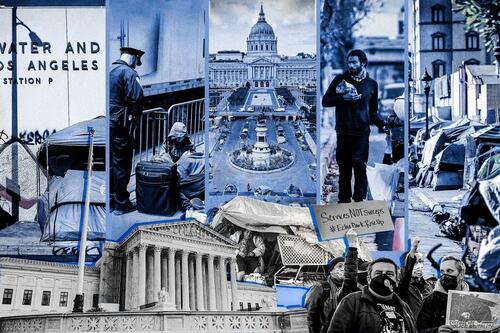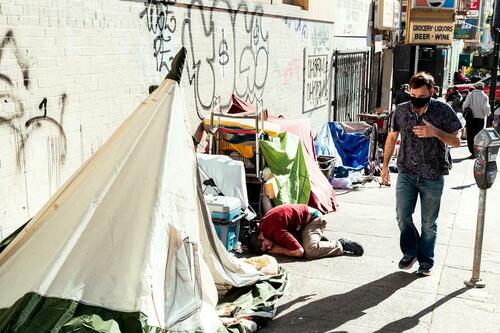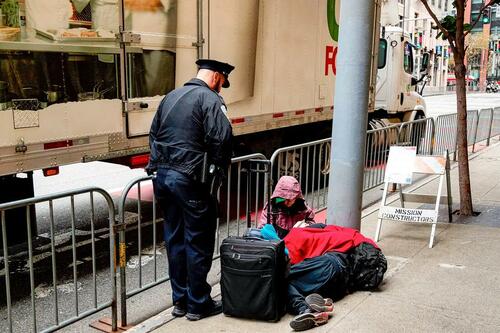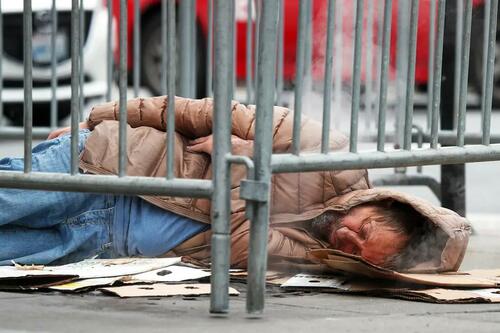
Authored by Michael Washburn via The Epoch Times (emphasis ours),
The homeless crisis in America is set to come to a head with a Supreme Court ruling as early as this spring, in the case of Johnson v. City of Grants Pass, Oregon.

The Supreme Court could—depending on what it decides—force changes in city ordinances and homeless policies across the country.
The decision is one of the most anticipated in years for San Francisco and other cities facing legal challenges from homeless people and advocacy groups.
At the heart of the case is the challenge by three homeless people to ordinances in the Oregon town of Grants Pass that prohibit homeless people “from using a blanket, pillow, or cardboard box for protection from the elements.”
The U.S. Court of Appeals for the Ninth Circuit, drawing on logic applied in the 2018 decision in Martin v. City of Boise, sided with the plaintiffs and blocked Grants Pass from enforcing its ordinance in the absence of shelters or other accommodations for the homeless.
The decision applies across nine western states, Alaska, Arizona, California, Hawaii, Idaho, Montana, Nevada, Oregon, and Washington.
Officials are left with two unappealing choices: let the sprawling encampments stand, or provide immediate emergency housing far beyond what their strained budgets allow for.
The Supreme Court, which announced on Jan. 11 that it will review the case, must either uphold or throw out the 9th Circuit’s ruling.
With close to 600,000 homeless people in America, according to recent Department of Housing and Urban Development figures, many cities that are bickering about what to do are paying attention to the case.

In Los Angeles, some 75,000 people live on the street, and the current mayor’s first action on taking office was to declare a homeless state of emergency.
In San Francisco, the crisis is so severe that residents are fleeing a city they have long cherished as one of the world’s most beautiful and livable locales, not to mention a dynamic tech hub. Nearly 8,000 people now live on the streets there.
Rampant public drug use, panhandling, urination, defecation, and other unruly conduct have taken over some areas of the City by the Bay and the city’s administration’s inability to enforce its own laws and clear out homeless encampments makes the crisis much worse.
“San Francisco is a mess, and even if it were to reduce its homeless population modestly, by a third, the streets would still look worse than most American cities,” Stephen Eide, a senior fellow at the Manhattan Institute who studies homelessness and public policy, told The Epoch Times.
The city is a battleground for myriad legal, social, economic, and political forces amid rising public alarm about homelessness. Lawyers there want to press pause on their own court battle over an injunction forbidding the police from cracking down on homeless camps. In their view, the looming Supreme Court case will render other legal struggles moot.
Homelessness advocates insist that longstanding legal precedent guarantees rights to people living on the street, and the city is not free to disregard those rights and take away homeless people’s property without due process, just because some of the homeless commit more serious violations and spark a public outcry.
But others who have studied the issue find providing housing for ever-growing numbers of homeless to be an unsustainable burden.

A Protracted Battle
San Francisco’s impasse has its roots in a lawsuit that a local advocacy group, the Coalition on Homelessness, launched in September 2022 with the aid of the ACLU Foundation of Northern California, the Lawyers’ Committee for Civil Rights of the San Francisco Bay Area, and the global law firm Latham & Watkins. Also named as plaintiffs in the suit were seven people who were, or had recently been, homeless.
One goal of the lawsuit was to stop the city from arresting and ticketing people who lived on the street, and clearing out their encampments—in short, to put an end to sweeps of homeless settlements and to put pressure on the administration to ramp up temporary housing for the undomiciled.
In a Dec. 23, 2022, ruling, Judge Donna Ryu of the U.S. District Court for the Northern District of California slapped the city with a preliminary injunction, denying it the power to enforce or threaten to enforce laws and ordinances that barred “involuntarily homeless individuals” from lying, sleeping, or sitting on public property.
Judge Ryu sided with the plaintiffs who believed that San Francisco Police Department (SFPD) actions had violated their Fourth Amendment right to be secure in their persons and possessions against unreasonable searches and seizures.

“Plaintiffs have presented significant evidence of a practice of seizing and destroying of homeless individuals’ unabandoned personal property in violation of the Fourth Amendment … and San Francisco’s own bag and tag policy, which clearly requires the City to store personal property so that homeless individuals may retrieve,” the judge wrote.
Lawyers for San Francisco unsuccessfully challenged Judge Ryu’s decision in federal court. In September 2023, the U.S. Court of Appeals for the Ninth Circuit shot down the city’s claim that Judge Ryu had overstepped legal bounds set in Martin v. Boise and Johnson v. Grants Pass.
On Jan. 11, another Ninth Circuit Court ruling clarified the definition of “involuntarily homeless” while substantially upholding the injunction.
Instead of appealing. San Francisco City Attorney David Chiu on Jan. 17 has filed a motion to essentially pause proceedings to wait for the Supreme Court decision on Grants Pass.
“It makes no sense to spend months litigating this case and expend enormous resources collecting evidence and expert testimony when the entire legal landscape may soon change,” Mr. Chiu said in a statement.
Read more here...
Authored by Michael Washburn via The Epoch Times (emphasis ours),
The homeless crisis in America is set to come to a head with a Supreme Court ruling as early as this spring, in the case of Johnson v. City of Grants Pass, Oregon.

The Supreme Court could—depending on what it decides—force changes in city ordinances and homeless policies across the country.
The decision is one of the most anticipated in years for San Francisco and other cities facing legal challenges from homeless people and advocacy groups.
At the heart of the case is the challenge by three homeless people to ordinances in the Oregon town of Grants Pass that prohibit homeless people “from using a blanket, pillow, or cardboard box for protection from the elements.”
The U.S. Court of Appeals for the Ninth Circuit, drawing on logic applied in the 2018 decision in Martin v. City of Boise, sided with the plaintiffs and blocked Grants Pass from enforcing its ordinance in the absence of shelters or other accommodations for the homeless.
The decision applies across nine western states, Alaska, Arizona, California, Hawaii, Idaho, Montana, Nevada, Oregon, and Washington.
Officials are left with two unappealing choices: let the sprawling encampments stand, or provide immediate emergency housing far beyond what their strained budgets allow for.
The Supreme Court, which announced on Jan. 11 that it will review the case, must either uphold or throw out the 9th Circuit’s ruling.
With close to 600,000 homeless people in America, according to recent Department of Housing and Urban Development figures, many cities that are bickering about what to do are paying attention to the case.

In Los Angeles, some 75,000 people live on the street, and the current mayor’s first action on taking office was to declare a homeless state of emergency.
In San Francisco, the crisis is so severe that residents are fleeing a city they have long cherished as one of the world’s most beautiful and livable locales, not to mention a dynamic tech hub. Nearly 8,000 people now live on the streets there.
Rampant public drug use, panhandling, urination, defecation, and other unruly conduct have taken over some areas of the City by the Bay and the city’s administration’s inability to enforce its own laws and clear out homeless encampments makes the crisis much worse.
“San Francisco is a mess, and even if it were to reduce its homeless population modestly, by a third, the streets would still look worse than most American cities,” Stephen Eide, a senior fellow at the Manhattan Institute who studies homelessness and public policy, told The Epoch Times.
The city is a battleground for myriad legal, social, economic, and political forces amid rising public alarm about homelessness. Lawyers there want to press pause on their own court battle over an injunction forbidding the police from cracking down on homeless camps. In their view, the looming Supreme Court case will render other legal struggles moot.
Homelessness advocates insist that longstanding legal precedent guarantees rights to people living on the street, and the city is not free to disregard those rights and take away homeless people’s property without due process, just because some of the homeless commit more serious violations and spark a public outcry.
But others who have studied the issue find providing housing for ever-growing numbers of homeless to be an unsustainable burden.

A Protracted Battle
San Francisco’s impasse has its roots in a lawsuit that a local advocacy group, the Coalition on Homelessness, launched in September 2022 with the aid of the ACLU Foundation of Northern California, the Lawyers’ Committee for Civil Rights of the San Francisco Bay Area, and the global law firm Latham & Watkins. Also named as plaintiffs in the suit were seven people who were, or had recently been, homeless.
One goal of the lawsuit was to stop the city from arresting and ticketing people who lived on the street, and clearing out their encampments—in short, to put an end to sweeps of homeless settlements and to put pressure on the administration to ramp up temporary housing for the undomiciled.
In a Dec. 23, 2022, ruling, Judge Donna Ryu of the U.S. District Court for the Northern District of California slapped the city with a preliminary injunction, denying it the power to enforce or threaten to enforce laws and ordinances that barred “involuntarily homeless individuals” from lying, sleeping, or sitting on public property.
Judge Ryu sided with the plaintiffs who believed that San Francisco Police Department (SFPD) actions had violated their Fourth Amendment right to be secure in their persons and possessions against unreasonable searches and seizures.

“Plaintiffs have presented significant evidence of a practice of seizing and destroying of homeless individuals’ unabandoned personal property in violation of the Fourth Amendment … and San Francisco’s own bag and tag policy, which clearly requires the City to store personal property so that homeless individuals may retrieve,” the judge wrote.
Lawyers for San Francisco unsuccessfully challenged Judge Ryu’s decision in federal court. In September 2023, the U.S. Court of Appeals for the Ninth Circuit shot down the city’s claim that Judge Ryu had overstepped legal bounds set in Martin v. Boise and Johnson v. Grants Pass.
On Jan. 11, another Ninth Circuit Court ruling clarified the definition of “involuntarily homeless” while substantially upholding the injunction.
Instead of appealing. San Francisco City Attorney David Chiu on Jan. 17 has filed a motion to essentially pause proceedings to wait for the Supreme Court decision on Grants Pass.
“It makes no sense to spend months litigating this case and expend enormous resources collecting evidence and expert testimony when the entire legal landscape may soon change,” Mr. Chiu said in a statement.
Read more here…
Loading…





